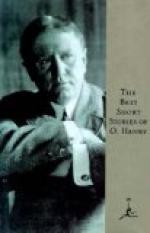“Ye’ll be a brither o’ the corp?”
“No, I’m no’ a brither o’ the corp.”
“Weel, ye’ll be his cousin?”
“No, I’m no’ a cousin.”
“At ony rate ye’ll be a frien’ o’ the corp?”
“No, I’m no’ that either. Ye see, I’ve no’ been very weel masel,” the stranger explained complacently, “an’ my doctor has ordered me carriage exercise, so I thocht this would be the cheapest way to tak’ it.”
WORTH A CHANCE
The small boy stood at the garden gate and howled and howled and howled. A passing lady paused beside him.
“What’s the matter, little man?” she asked in a kindly voice.
“O-o-oh!” wailed the youngster. “Pa and ma won’t take me to the pictures to-night.”
“But don’t make such a noise,” said the dame, admonishingly. “Do they ever take you when you cry like that?”
“S-sometimes they do, an’—an’ sometimes they d-d-don’t,” bellowed the boy. “But it ain’t no trouble to yell!”
CHANGE FOR THE BETTER
“We were bounding along,” said a recent traveller on a local South African single-line railway, “at the rate of about seven miles an hour, and the whole train was shaking terribly. I expected every moment to see my bones protruding through my skin. Passengers were rolling from one end of the car to the other. I held on firmly to the arms of the seat. Presently we settled down a bit quieter; at least I could keep my hat on and my teeth didn’t chatter.
“There was a quiet-looking man opposite me. I looked up with a ghastly smile, wishing to appear cheerful, and said:
“‘We are going a bit smoother, I see.’
“‘Yes,’ he said, ‘we’re off the track now,’”
BIG CHANCES BOTH WAYS
The famous physician and the eminent clergyman were deep in a discussion which threatened to become acrimonious.
“You see,” said the minister sarcastically, “you medical men know so much about the uncertainties of this world that I should think you would not want to live.”
“Oh, I don’t know,” responded the physician caustically. “You clergymen tell us so much about the uncertainties of the next world that we don’t want to die.”
WARNING TO AUTHORS
One of Mr. Kipling’s trees was injured by a bus, the driver of which was also landlord of an inn. Kipling wrote this man a letter of complaint, which the recipient sold to one of his guests for ten shillings. Again the angry author wrote, this time a more violent letter, which immediately fetched one pound.
A few days later Kipling called on the landlord and demanded to know why he had received no answer to his letters.
“Why, I was hoping you would send me a fresh one every day,” was the cool reply. “They pay a great deal better than bus driving.”




